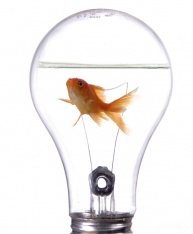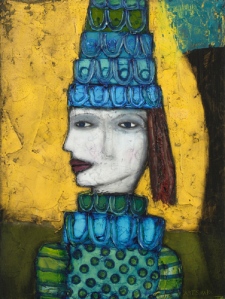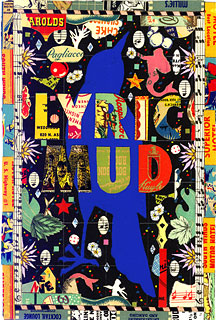I’m looking at a photograph of Oliver. Oliver lives in Brooklyn NY. In the photograph Oliver is lying on his back in a shady spot in Prospect Park. The sun is dappling the tree limbs that hang above his head and he is staring upward in utter fascination and amazement at the light and trees above him. His arms are spread wide as if to allow the enormity of what he is seeing to encompass his senses.
Oliver is seeing the world for the first time and embracing it with a sense of wonder and joy that is natural to him as a newcomer to the game.
As I look at Oliver in this state I imagine that images he perceives are generating many new ideas. Actually the thought of “an idea” may be pretty new to young Oliver. Yet I can see by his amazed expression that there is a world of evolution happening behind that face. A billion neurons firing over synapses creating new memories of now that instantly become reference for defining the next stimulus- perhaps a bird or an airplane that flies through his line of vision.
Is this process frightening to Oliver? His eyes wide with wonder his mouth slightly opened, his arms splayed wide, I would say he looks pretty comfortable.
As an artist I recognize Oliver’s state of mind as one of direct engagement. One in which his mind rather than buffering the internal world of assumption expectation and judgment is engaging the totality of everything he sees and because what he sees is so new to him his mind does not try to filter only what he understands.
The cognitive psychologist might argue this point with me and would surely win. This is what I imagine Oliver to be thinking because this type of “seeing” this type of “being” is so difficult for me as a mature adult to achieve. And yet as an artist- a practicing improviser – my success depends upon achieving this state.
To say that Oliver is improvising would be a gross overstatement. But Oliver is doing something that is an essential aspect to improvisation. He is “embracing uncertainty with deep interest and trust.”
What does the word improvise mean? Its technical definition is the act of “bricolage.” Using whatever materials are available in the moment to create something new. And that is one aspect of what happens when we improvise.
But this definition gives me nothing to help me explain or understand how fundamental improvisation is to our daily existence and every task related to our existence that we deem important for any reason whatsoever.
Does the word improvisation seem threatening ? And if so then why?
To improvise means to repurpose meaning. It does not mean to create something totally new from scratch- that is something altogether different.
To improvise means to literally improve upon what is. Improvisation is at the core of our thinking process and at the core of every interaction we have – unless of course you are reading a script that defines your words and motions. In that case you’ve eliminated any margin of uncertainty and it becomes unnecessary to even consider improvising.
Think about any normal conversation. You encounter someone- your next door neighbor with whom you have no invested relationship other than a desire to remain neutral. You exchange superficial banter regarding weather, the kids, general climate. There’s no script for this dialogue and yet there is a shared vision that you both tacitly agree on. Let’s make nice and keep it simple. But then your daughter comes bounding out of the house and announces that she saw her neighbor’s daughter out with a guy in a nightclub the night before which clearly surprises your neighbor. An element of uncertainty has just been added to the social improvisation and things immediately take on a different pace.
What price do we pay for the instinctual (some might say learned ) reaction to uncertainty?
What price would Oliver pay if instead of allowing all of the new images to flood into his mind he shut his eyes tight against the world and saw only what he could be sure about- only what was certain. What would that be for a child of his age? Not much.
Do we really take in so much in our years between childhood and the onset of adulthood that we can afford to block out possibility by eliminating what we think causes uncertainty?
We have learned to subconsciously avoid uncertainty by categorizing all that is unfamiliar into categories that we recognize. That is an essential cognitive pattern in the way we understand our world.
But to what extent to we bypass new possibility in the unconscious rush to quiet uncertainty as it begins to emerge?
If you can recognize the emergence of uncertainty before you shift your perception to “fit” the unrecognizable into a place of certainty, try and hold yourself there for a few moments to see what emerges.
What does that place feel like?
For Oliver it is a place of wonder and ecstasy.
Can we really afford to stem the flow of ideas?
Watching Oliver I understand how fundamental to the pleasure of our existence that flow is.









